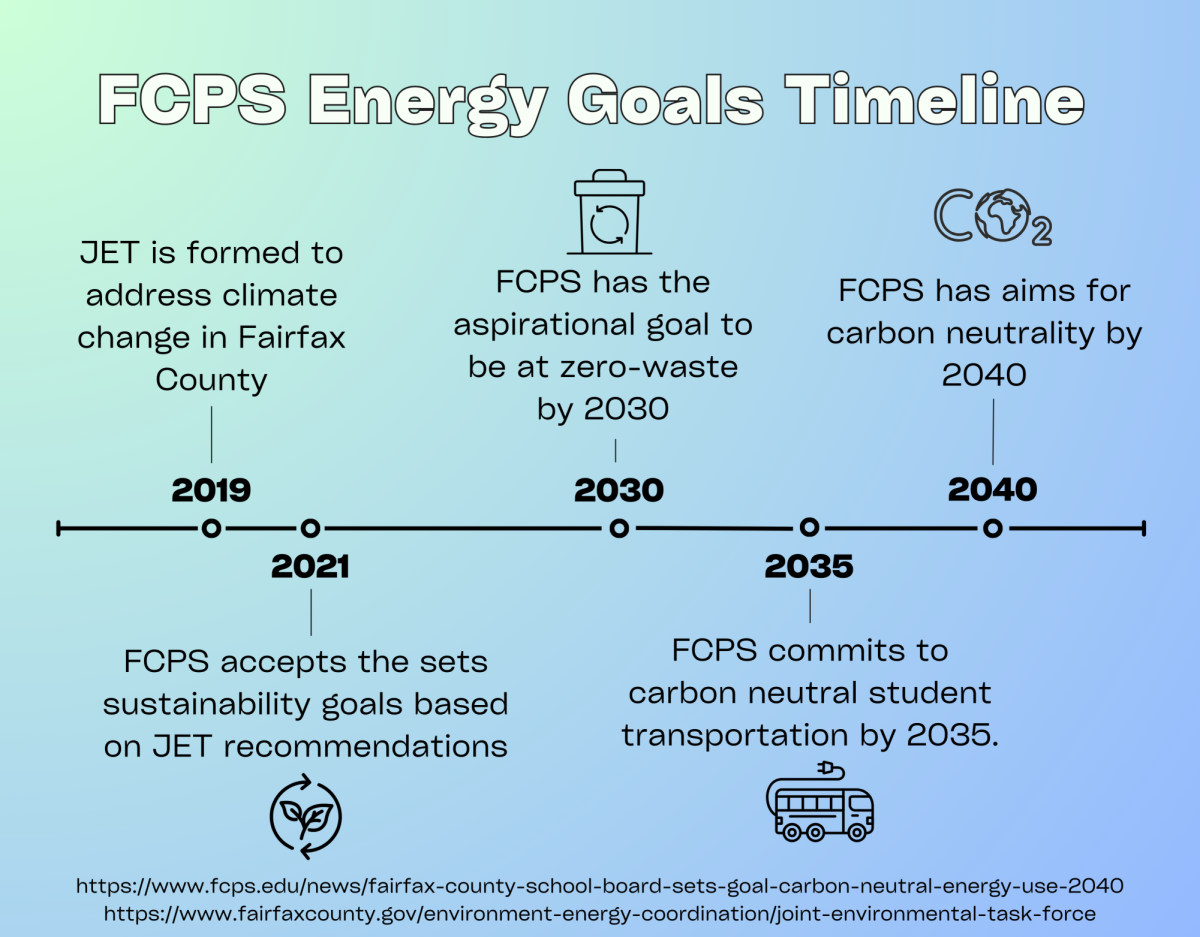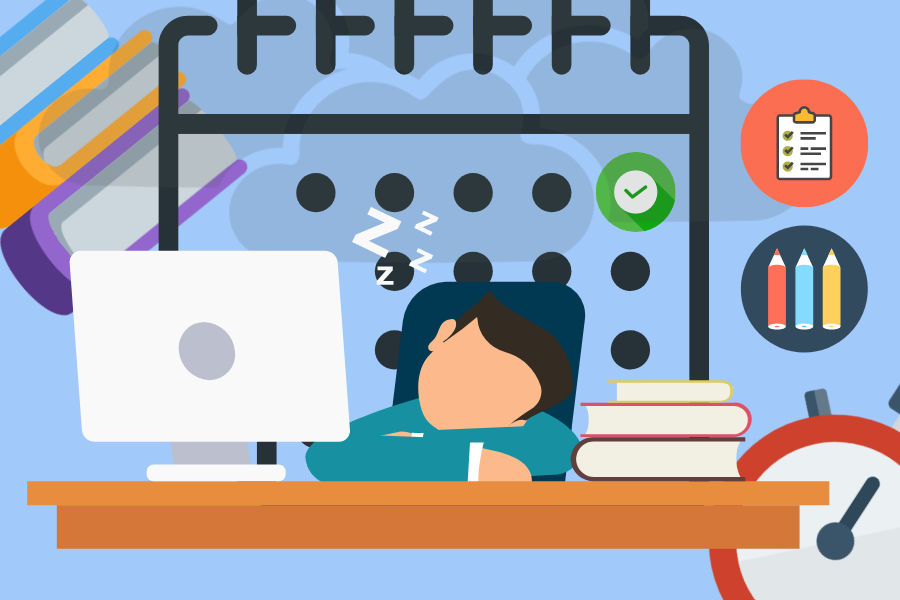As the first week of May begins, it inevitably marks the daunting first week of AP exams. The energy within each AP classroom intensifies. Complaints of stress — the most prominent one being that an entire year’s worth of content is crammed into one all-consuming exam — dominate conversations between classmates.
Some may have started their formal studying weeks or even months in advance using YouTube videos and review books. Others rely on only guidance from teachers, but in many classes, the end of new content and the start of review falls on the very last days before the exam.
Cramming the last units of content weeks before the exam forces students to go to extreme lengths on their own or even teach themselves the last units entirely — all unsustainable practices for learning content, let alone college-level material.
The time to prepare for a different exam season this May is now.
AP teachers should alleviate this issue by adjusting plans responsively and ending all new content two weeks before each exam. College Board leaders, in turn, should progressively reduce the amount of content on exams and provide consistent and complete review materials on which teachers can rely.
While many teachers make efforts to teach all content within the allocated time frame, it’s difficult for them to complete all College Board-required content for each exam. This tight schedule is exacerbated by holidays and unexpected days off from severe weather.
“[College Board] doesn’t provide anything in the way of a calendar,” said AP History teacher Richard Obando. “They give you the units. These are the topics. Here are the videos that go with it. Here’s the terminology. Here are guidelines on the writing prompts. And that’s about it.”
While AP courses include some standardized material across the country, College Board curriculum writers have disregarded the pace at which educators may vary their instruction. With the amount of content necessary to be taught, teachers have to enforce rigid timing that ignores whether or not their students have demonstrated an understanding of each unit.
“For the Comparative Politics class, [College Board’s] recommendation is to teach chronologically, which goes against the way I’ve taught it for the last 20+ years,” said AP Comparative Politics teacher Andrew Sonnabend. “We can’t really use what the College Board tells us in terms of timing.”
Obando and Sonnabend had well-thought-out schedules at the beginning of the year, but they had to alter them because of various atypical school days.
“It would be nice if [College Board] had some sort of suggested calendar that said ‘you should finish this unit by approximately this date,’” Obando said. “That would allow teachers in different school districts and schools to look at their school calendar and look at College Board’s calendar and integrate the two so that the course had the appropriate pacing.”
Still, some teachers will lecture on non-essential content or spend extraneous time on one unit by defaulting to past materials they’ve made, according to students.
Despite efforts to retain information throughout the year and begin studying in advance, students find the magnitude of content unmanageable.
In an informal Black & White survey of students enrolled in at least one AP course in the spring of 2022, over 47% said they were not able to get through all of the content required on their exam by the College Board. Another 42% of students said they did not feel prepared for their AP exams.
“The tests we take in class, that are supposed to replicate the AP exam, are a lot different than they actually are on the exam,” junior Jinara Weerakoon said. “Even the practice exams that we do are not reflective of what the College Board actually gives you.”
For better AP exam preparation, the College Board should create a standardized, small body of assignments for each unit to cover the entire course’s content in the allotted time and leave room for teachers to respond to their classes’ needs. In addition, teachers should make sure that any practice exams or work completed during class time are representative of the real exam.
With focused adjustments to test review and practice exams, student stress may reduce dramatically and, more importantly, the College Board will have to confront the reality of their expectations before adjusting them to prepare and teach students.
When the first week of May begins, a conversation between classmates should revolve around summer plans — not stories of cramming. Spring doesn’t have to be stressful if educators prepare students for their upcoming exams.
This story was originally published on The Black & White on January 30, 2023.































![IN THE SPOTLIGHT: Junior Zalie Mann performs “I Love to Cry at Weddings,” an ensemble piece from the fall musical Sweet Charity, to prospective students during the Fine Arts Showcase on Wednesday, Nov. 8. The showcase is a compilation of performances and demonstrations from each fine arts strand offered at McCallum. This show is put on so that prospective students can see if they are interested in joining an academy or major.
Sweet Charity originally ran the weekends of Sept. 28 and Oct. 8, but made a comeback for the Fine Arts Showcase.
“[Being at the front in the spotlight] is my favorite part of the whole dance, so I was super happy to be on stage performing and smiling at the audience,” Mann said.
Mann performed in both the musical theatre performance and dance excerpt “Ethereal,” a contemporary piece choreographed by the new dance director Terrance Carson, in the showcase. With also being a dance ambassador, Mann got to talk about what MAC dance is, her experience and answer any questions the aspiring arts majors and their parents may have.
Caption by Maya Tackett.](https://bestofsno.com/wp-content/uploads/2024/02/53321803427_47cd17fe70_o-1-1200x800.jpg)
![SPREADING THE JOY: Sophomore Chim Becker poses with sophomores Cozbi Sims and Lou Davidson while manning a table at the Hispanic Heritage treat day during lunch of Sept 28. Becker is a part of the students of color alliance, who put together the activity to raise money for their club.
“It [the stand] was really fun because McCallum has a lot of latino kids,” Becker said. “And I think it was nice that I could share the stuff that I usually just have at home with people who have never tried it before.”
Becker recognizes the importance of celebrating Hispanic heritage at Mac.
“I think its important to celebrate,” Becker said. “Because our culture is awesome and super cool, and everybody should be able to learn about other cultures of the world.”
Caption by JoJo Barnard.](https://bestofsno.com/wp-content/uploads/2024/01/53221601352_4127a81c41_o-1200x675.jpg)






